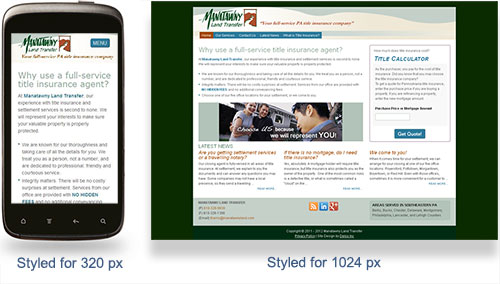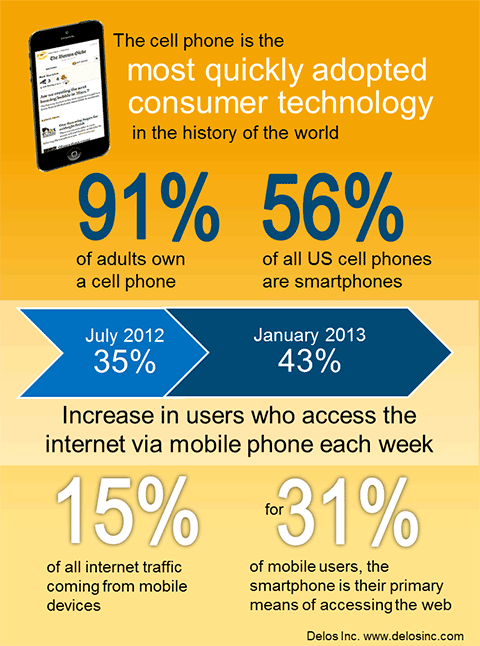We have been stressing to our customers how important the mobile web is, but I’m really surprised at how fast mobile visits have been growing for local websites. We are now routinely seeing at least 25% of all website visits from mobile and tablet devices across all our clients. Looking at traffic for the Collegeville Farmers’ Market for the past month, for example, almost 40% of visits were from mobile devices!
I have been telling businesses to make their websites mobile responsive for over two years, but now we have reached the tipping point—it is no longer optional. The use of smartphones and tablets for internet use is increasing each day. Just this past week, Google announced that they will start penalizing your website ranking if it doesn’t work well on a smartphone. (SeachEngineLand)
Have you looked at your website on mobile devices?
You should. Look for the following:
- Does your website work?
- Can you read it, or do you have to zoom and scroll?
- Is your address and phone number available on every page?
- Can you click on your phone number to call your business?
Then try searching for your business from different mobile devices. Look for this:
- Can you find your business from search?
- Can you find it from maps?
What you see is what your customers see. Is this the type of customer experience you would enjoy as a customer? If it is not optimal, you need to update for mobile.
Do you need an app or a separate mobile website?
For most businesses, the answer to both is no.
Apps can be expensive to develop, and you need to have different versions for different devices: Android, iOS, BlackBerry and Windows. If you do develop an app, people will still look for you on the web from their mobile devices, so you still need a mobile website too.
I don’t recommend a separate mobile website for most businesses. There are a few reasons for this:
- A separate mobile site means you need to update and maintain two websites. (You are updating your website with relevant content, right?)
- You must also be careful about the construction of your mobile site content and links, so that you do not hurt your search optimization efforts. If you go with a service that automatically creates a mobile site for you, you may be diluting your company’s search rankings because that site is not on your own domain.
- Usability is another concern. Most users switch between multiple devices for their use of the web. They may return to your site on mobile after visiting on a desktop, and be unable to find what they are looking for because of inconsistent navigation or incomplete information on the mobile version.
- When users share your content, there can also be problems when a mobile link is shared and then viewed by someone else using a desktop browser.
- A separate mobile site depends on your website being able to recognize the various mobile devices. There are some technical problems with this as some mobile devices present themselves as desktop browsers, and there are constantly new devices coming out with different configurations and screen sizes. This can be a lot of work to keep up to date.
Use responsive design
Luckily, there is a single website solution that can meet your needs: Responsive design. Responsive design is a method of adding styles to your website so that it automatically changes its shape based on the screen width of the device it is viewed on. For example, a user on a desktop may see three columns of information, but on a mobile phone images automatically scale and the information may be presented in a single column.
The benefits of responsive design include:
- one site to update and maintain
- device independent – resizes based on the width of the current screen
- better for your search optimization efforts as there is a single version of each page
- consistent experience for your users no matter how they access your site
- Google’s recommended configuration for optimizing your site
What do the numbers say?
- The cell phone is the most quickly adopted consumer technology in the history of the world. (Pew Internet Research)
- Mobile makes up 15% of all Internet traffic. (TechCrunch)
- Smartphones account for 56% of all mobile subscribers, up from 35% just two years ago. (Pew Internet Research)
- In a Jan 2013 survey, 43% of users accessed the internet via a mobile phone each week – 8points higher than in Jul 2012. (eMarketer)
- 31 percent of mobile internet users say that’s the primary way they access the web (Harvard Business Review)
All this is important to you and your business because smartphone users use their phones to plan and participate in their activities, including looking up businesses and their products, getting online maps and directions, and comparing prices and reading reviews while shopping.
Key Takeaways
Make sure you know what your customer experience on mobile looks like today. I talk to many business owners who have never checked their own site on various mobile devices.
How important is mobile? The mobile internet explosion is here. If your mobile presence is not the experience you would like to have as a customer, fixing that should be a priority.



